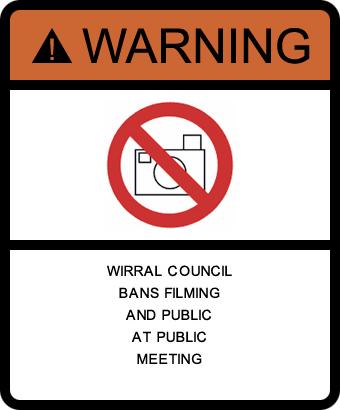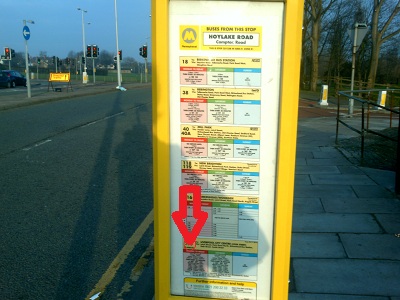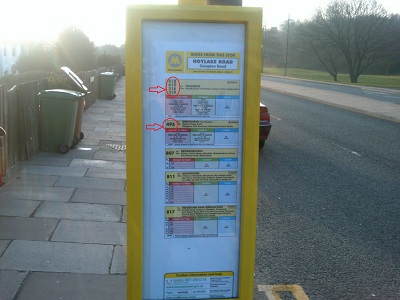Labour U-turn on filming of Wirral Council public meetings
It’s rare I write a blog post on a Sunday but I thought it best to write an update about how the issue of filming of council meetings (at least in England) is progressing as it was discussed in the House of Commons on Monday 28th October as part of the second reading of the Local Audit and Accountability Bill.
I will quote from what MPs said in that debate along with my own comments on what was said. The quotes are from Hansard, you can also watch video footage of the debate on Parliament TV (the date was Monday 28th October 2013), but as the debate went on for many hours it can be difficult to find the parts about filming.
First to speak on this issue was the Minister for Communities and Local Government, the Rt Hon Eric Pickles MP who said, “Perhaps our most significant proposal is to give people the right to film, blog or tweet at council meetings. Some councils would prefer meetings to be held behind closed doors, but the public has the right to see decisions being taken and how the money is spent.
A private Member’s Bill promoted by Mrs Thatcher introduced the right to attend council meetings back in 1960, and that in turn built on a law introduced by the Liberal Government of 1908, so this is truly a coalition of minds. It is right that we should now bring her legacy up to date for the digital age. We have previously amended secondary legislation to open up councils’ executive meetings and have encouraged councils to open up their full council and committees. Many have refused, however, citing health and safety, data protection or just standing orders. Tower Hamlets said that such a change would lead to “reputational damage”. Well, yes, it probably will when people see what is going on in their council chambers. There have even been cases of the police being called to threaten bloggers with arrest. We will therefore make the necessary changes to primary legislation to allow full councils and committees to be open as well.
Our argument is that the coalition Government are scrapping the top-down red tape of Whitehall inspection and micro-management. That will save taxpayers’ money and help to devolve power, but it must go hand in hand with local transparency and accountability. We must ensure an independent free press and scrutinise and challenge bad decisions by councils. Individual taxpayers and the new wave of citizen journalists must be let in to conduct their own scrutiny. We are localising audit and scrapping protection, while ensuring that there is protection against the bad old days of municipal corruption. In short, the Bill will deliver greater openness, stronger local democracy, accountability and significant savings for the taxpayer. I commend it to the House.”
My comments on what Eric Pickles said are that currently the public (and press) already have the right to film, blog and tweet at Wirral Council meetings already which is granted to them by article 10 (freedom of expression) of the Human Rights Act 1998 c.42. It is unlawful for any council to act in a way that is incompatible with article 10 (freedom of expression) due to section 6 of the Human Rights Act 1998.
The legislation introduced by Margaret Thatcher referred to by the Rt Hon Eric Pickles MP is the Public Bodies (Admission to Meetings) Act 1960 c.67. The secondary legislation referred to by the Rt Hon Eric Pickles MP is the more recent Local Authorities (Executive Arrangements) (Meetings and Access to Information) (England) Regulations 2012 (which at Wirral Council only applies to Cabinet meetings and decisions made by individual Cabinet Members).
“Many have refused, however, citing health and safety, data protection” seems to be a reference to Wirral Council, this tweet below of mine from June shows my frustration as both reasons were given in reference to a Planning Committee meeting, the same reasons (although apart from that one Planning Committee meeting not used together at the same meeting) have been given at other Wirral Council meetings in the past twelve months too. Wirral Council have never given standing orders as a reason as there isn’t anything in their current constitution (or past constitution) about it. Personally I’ve never been threatened with arrest or the police for trying to film a meeting, although in other parts of the UK people have.
was barred from filming Wirral Council's Planning Committee tonight, usual excuses health and safety, data protection both are bogus reasons
— John Brace (@level80) June 27, 2013
Hilary Benn MP, Labour’s Shadow Secretary of State for Communities and Local Government said on the issue of filming, “We will therefore support that change, and also the proposal that councils in England should allow the recording and videoing of council and committee meetings. In this day and age, big changes in technology make recording and videoing readily possible, and I cannot see the difference between sitting in a meeting, listening and writing down what is being said, or—for those who have shorthand—taking a verbatim record, and making one’s own recording.
As the Secretary of State acknowledged, a new generation of bloggers is relating to politics in a different way, which we should all warmly welcome—frankly, the more people who get to hear what their local council is doing, the better. Who knows? Perhaps this House will one day follow suit and allow those watching us to keep their own records of proceedings—indeed, I may one day be tempted to record the Secretary of State from across the Dispatch Box. I have, however, a sneaking suspicion that Brass Crosby—who, as some Members will know, was committed to the Tower of London in the 1770s for daring as Lord Mayor to release a newspaper editor who had had the audacity to report what was happening in Parliament—and indeed Thomas Hansard, after whom the Official Report is named, would both thoroughly approve of that change.”
The reason why this would only apply to councils in England is because in the other parts of the UK (Wales, Scotland and Northern Ireland) that it’s up to the Welsh Assembly Government, Scottish Parliament or Northern Ireland Assembly to decide whether they want this sort of change. Hilary Benn is right that at the moment anyone could publish a verbatim account of Council meetings, the main difference between that and an audio recording is that an audio recording also records how something is said.
Video adds an extra element of body language though, not just of the person speaking but of the reaction of other politicians to what’s being said. Hilary Benn also went as far as to tweet about this (his tweet is below):
People should be able to record and video council and committee meetings Mr Hansard would approve! #transparency
— Hilary Benn (@hilarybennmp) October 28, 2013
I welcome Hilary Benn’s tweet and Labour’s support for a change in the law to make things clearer to local councils. I have seen in the past Labour councillors criticise during a Council meeting one of the opposition councillor groups for taking a different policy position to that of their party nationally. I hope Wirral Labour councillors will take heed of the tweet of their frontbench spokesperson Hilary Benn on the matter.
The next stage in the Local Audit and Accountability Bill’s progress through the House of Commons is the Committee stage which was on November 4th at 4pm in Committee Room 13 at the Palace of Westminster (ironically for a bill with accountability in the title this stage is being held in private not public). I’m sure myself and many other bloggers in England will be keen to follow this bill and await the text of the amendments to the Local Audit and Accountability Bill in relation to filming with interest.
The tweet of Labour’s spokesperson nationally on this issue will hopefully prevent any attempts by Wirral Labour councillors at censorship of filming of Wirral Council meetings between now and when the bill becomes law, as if they do try to stop filming they will lay themselves open to the criticism they make of others in saying one thing nationally, but doing another at the local level.
If you click on any of these buttons below, you’ll be doing me a favour by sharing this article with other people. Thanks:
 Bizarrely at the start of the Pension Committee all members of the public were asked to leave by the Chair (who seemed to conveniently forget that the public
Bizarrely at the start of the Pension Committee all members of the public were asked to leave by the Chair (who seemed to conveniently forget that the public 

